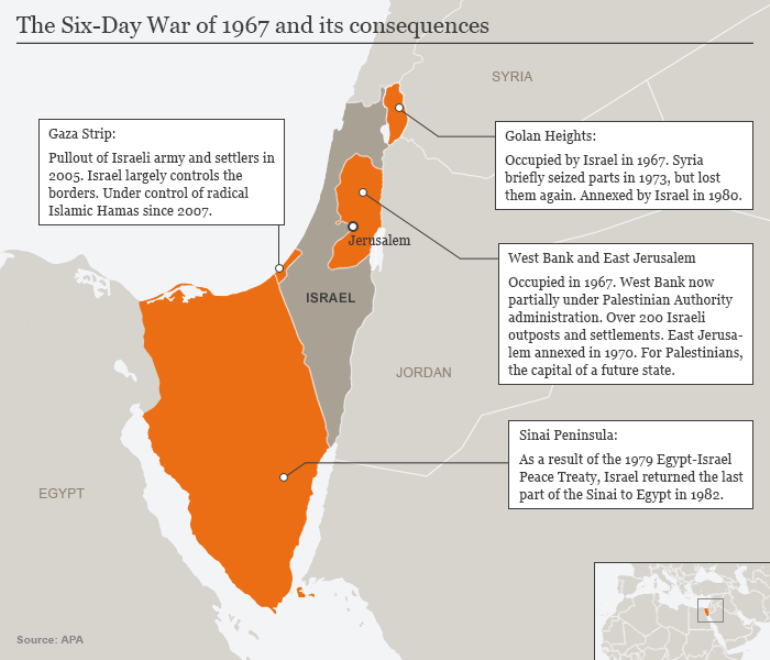"People became hostages of the annexation"

What circumstances led to the war in June 1967?
Salim Tamari: The direct cause was the closure of the Straits of Tiran by Egypt's Gamal Abdel Nasser, which the Israelis regarded as a blockage of their access to international waters. The actual events had a lot to do with Israel's continued rejection of UN Security Council resolutions about the future of refugees and issues at the borders between Israel and Egypt in the Gaza area.
The war was over in a matter of days in June 1967. What was the result?
Tamari: The immediate result was the defeat of the combined armies of Syria, Egypt and Jordan and the capture by Israel of all of the Sinai Peninsula, all of the West Bank and a big part of the Golan Heights from Syria. The immediate result was not only totally devastating for the regimes, but also for the people of Palestine living in both the West Bank and Gaza.

How did it change people's lives?
Tamari: Two major things happened in terms of daily life. The first was that Palestinians living in Gaza, the West Bank and the Golan Heights no longer had access to the airport. They were completely blocked from travelling, making trade and having any kind of communication with the wider cultural world. The second thing that happened was that the markets of West Bank and Gaza were integrated with Israel's. The only salutary effect was that people could have access to historic Palestine and to the homeland they had lost in 1948, as well as having contact with Palestinians who were now Israeli citizens and now found themselves part of the single Israeli-controlled historical area of Palestine. Jerusalem was formally annexed and Arab Jerusalemites became residents, so they ultimately had far more opportunity to acquire work permits and to travel more freely than either the population in the West Bank or the Gaza Strip.
I was recently in Jerusalem and the West Bank and spoke to many Palestinians who told me that for them 1948 played the greater role. Can you relate to that?
Tamari: The reference to 1948 versus 1967 is significant, because many people living in the West Bank and Gaza happened to be refugees from the 1948 area which became the state of Israel. People who became refugees in 1967 now live mostly in the Arab world.[embed:render:embedded:node:27989]If you talk to them, they would stress this combined process of 1948 and 1967. People here were historically traumatised by the 1948 war, yet 1967 means something completely different to them: they did not become refugees, they became hostages of the annexation of the West Bank and Gaza in the state of Israel.
You moved to the West Bank in the late 1960s. How has occupation and the people living with it, changed over the past 50 years?
Tamari: The main difference in the early period of occupation was that there was a feeling that this is going to be forever. The Arabs were defeated; militarily they were unable to fight back. Israel was so hegemonic that people started accepting the idea of a very long occupation. Then the Intifada [Palestinian uprising] happened in 1987 and people began to hope that things might change. But the Oslo Accords in 1993 were very disappointing, ushering in as it did a continuation of occupation in its various forms under the guise of so-called autonomy. And that produced a completely different vision – which altered how most people thought – from the fight for independence and the struggle for two states to one in which the idea of legal struggle has become uppermost.
There are many joint peace initiatives between Israelis und Palestinians. Do you think they are helpful or do you think that, as long as there is no political change, they are not?
Tamari: They did engender change following the first Intifada. There was a substantial amount of inter-ethnic solidarity, which ultimately led to the negotiations in Oslo. The eventual outcome has made many people wary of creating another wave of momentum like that.
The other issue is that there is no longer any real force for peace in Israel; its constituent parties, including the Israeli left, have basically collapsed in number. But there are people who are still fighting. There are acts of civil disobedience and peaceful protests. In creating different visions of co-operation, I believe they do make a difference. But at the moment they are not translatable to a political momentum.
What do you expect from the international community in order to end occupation and to make a two-state solution happen?
Tamari: The international community has to address the issue of expropriated land in the occupied territories and the expansion of building settlements. An atmosphere needs to be created in which Israel is required to abide by the conditions leading to withdrawal from the occupied territories. These are well-known factors. But at the moment, neither Europe nor, dare I say it, America, is willing to translate these political positions into action.
Interview conducted by Diana Hodali
© Deutsche Welle 2017
